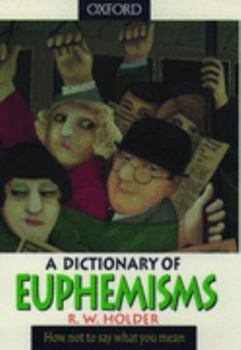A Dictionary of Euphemisms
Select Format
Select Condition 
Book Overview
We all use euphemisms every day. We speak of "full-figured" women. We "fudge" on our income tax. We step lively to avoid "horse apples"--and step even livelier in the grip of the "Aztec Two-step." We say that the dead have "bit the dust" or have been "promoted to glory." Now, in A Dictionary of Euphemisms, R. W. Holder gives us an engaging volume that celebrates this human tendency to use mild, vague or roundabout expressions rather than those which are blunt, precise, and disagreeably true.
Here are thousands of entertaining and informative entries that range from long-established circumlocutions such as "everlasting life," "the Grim Reaper," "powder room," and "house of ill repute," to recent coinages such as "odorously challenged" (smelly), "corporate entertainment" (bribery), "AMW - actress, model, whatever" (prostitute), "downsizing" (laying off workers), and "white-knuckler" (a commercial flight on a small aircraft). Arranged in alphabetical order, the Dictionary gives definitions, examples from real authors, and historical explanations where appropriate. Holder also includes an extensive bibliography and, equally important, a Thematic Index, so that readers can look up euphemistic words and expressions for Death, Mental Illness, Narcotics, Obesity, Poverty, and other topics.
A Dictionary of Euphemisms is a browser's delight and an essential reference book for all lovers of language. Readers will find in it a captivating guide to the art of not saying what we mean.
Here are thousands of entertaining and informative entries that range from long-established circumlocutions such as "everlasting life," "the Grim Reaper," "powder room," and "house of ill repute," to recent coinages such as "odorously challenged" (smelly), "corporate entertainment" (bribery), "AMW - actress, model, whatever" (prostitute), "downsizing" (laying off workers), and "white-knuckler" (a commercial flight on a small aircraft). Arranged in alphabetical order, the Dictionary gives definitions, examples from real authors, and historical explanations where appropriate. Holder also includes an extensive bibliography and, equally important, a Thematic Index, so that readers can look up euphemistic words and expressions for Death, Mental Illness, Narcotics, Obesity, Poverty, and other topics.
A Dictionary of Euphemisms is a browser's delight and an essential reference book for all lovers of language. Readers will find in it a captivating guide to the art of not saying what we mean.
Format:Hardcover
Language:English
ISBN:0198692757
ISBN13:9780198692751
Release Date:February 1996
Publisher:Oxford University Press
Length:492 Pages
Weight:1.45 lbs.
Dimensions:9.2" x 0.8" x 6.2"
Customer Reviews
4 ratings
An adventure in the English language
Published by Thriftbooks.com User , 16 years ago
Cool means: low temperature. Or does it mean that's fine? Or suave? Or relaxed? "Oxford Dictionary of Euphemisms: How Not To Say What You Mean" is an adventure in the English language outlining the countless words in the English language that have so many meanings thanks to changing times and slang, that it's hard for even a native speaker to stay on top of the changes. "Oxford Dictionary of Euphemisms" is a must for anyone who speaks English or is trying to learn when everyone else is barely speaking it to begin with.
Must read for lovers of words
Published by Thriftbooks.com User , 19 years ago
The contents may be offensive to some readers. So be it! Words and their usage are part of our language. As an aside, I'd like to see someone take on the task of relating euphemisms to short titles of Congressional bills: Leave No Child Behind Act; Fair Tax Act; The USA Patriot Act; Help American Vote Act...
A fun reference book that may make you blush...
Published by Thriftbooks.com User , 20 years ago
This is a good reference book for readers and writers, and possibly courageous public speakers. A thematic index at the back of the book makes finding the right term easy. The entries provide concise, clear definitions, as well as quoted sources which add clarity as to the origin and usage of the word or phrase. These authorities are cross-referenced to an author/work bibliography in the front of the book, handy for those who wish to conduct further research. Many of the euphemisms deal with sexual topics, a possible commentary on either the repressive or playful nature of our social mores. Most of the words and phrases are modern, at least within the last fifty years, but some obsolete terms are included, often to show comparison to current usage. While not an exhaustive study of euphemisms, or a substitution for a good slang dictionary, this is a great reference book to have, to use, and to read -- just for the fun of it.
Straightforwardness over euphemism every time
Published by Thriftbooks.com User , 22 years ago
R.W. Hodderfs dictionary is very helpful for those of us who want to say and write to be helpful without ambiguity, and who rail against the subversion of political correctness.How Not To Say What You Mean is the updated guide to probity, candor, earthiness, and straightforwardness. The dictionary provides definitions with example sentences as well as explanations where appropriate. Thematically indexed the entries are wide-ranging: work, sexuality, bankruptcy, clothing, education, politics and aircraft, provide the real meaning for phrases well-known and obscure we come across daily in speech and writing such as liquidity crisis, coronary inefficiency, four-letter man, normalization, investigative journalism, governmental relations, ethically challenged and year of progress.Itfs a dictionary to browse, to be entertained by and take courage from. Highly recommended for all who have the courage to say and write what we mean.





